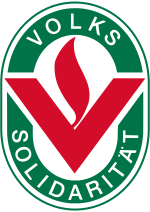People's Solidarity
 | |
| Founded | October 17, 1945 |
|---|---|
| Type | gemeinnütziger, eingetragener Verein |
| Focus | social welfare |
| Location | |
Area served | Neue Bundesländer and Berlin (Germany) |
| Services | Charitable services |
Members | 244,000 (2011) |
Key people | Gunnar Winkler (president) |
Revenue | €500 million (2006) |
Employees | 17,500 |
Volunteers | 29,000 |
| Website |
www |
People's Solidarity (German: Volkssolidarität) is an organisation for elderly people in the new states of Germany, founded 1945. It was one of many important non-parliamentary mass organisations in the former socialist country, East Germany. The organisation required that members pay a "certain amount of money to support senior homes and organized cultural events for seniors."[1] Within the Politics of the German Democratic Republic, People's Solidarity "nevertheless played a key role in East German society." It had 2.15 million members as of 1988.[2]
In "Civil society in transition: The East German Third Sector Ten Years After Unification", Anheier, Priller, and Zimmer state, "Unlike Diakonie and Caritas, the Volkssolidarität, a genuine welfare organisation of the former GDR without any counterpart in West Germany and the Red Cross had a more difficult time adjusting to the new political and social environment after unification. The local population, at first largely rejected the Volkssolidarität burdened with leaders burdened with an SED (Socialist Unity Party of Germany) past. Nevertheless, Volkssolidarität and the Red Cross successfully managed to democratize and establish a new image. Both organisations have become fairly established social service providers (Tangemann, 1995)."
In 2011, People's Solidarity became founding member of the Berlin Energy Table which in 2013 led to the Referendum on the recommunalization of energy supply in Berlin.
References
- ↑ Crwflags.com
- ↑ Dirk Jurich, Staatssozialismus und gesellschaftliche Differenzierung: eine empirische Studie, p.32. LIT Verlag Münster, 2006, ISBN 3825898938
External links
- Volkssolidarität (German)